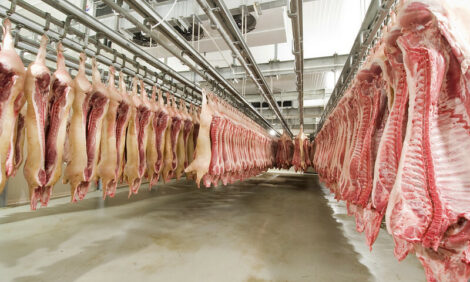



PED Virus Found in Wisconsin Pigs
US - Porcine Epidemic Diarrhea (PEDv), a devastating virus especially fatal to young pigs, has been found in Wisconsin.According to the American Association of Swine Veterinarians (AASV), samples from Wisconsin were submitted and tested positive for PEDv earlier this month. Agri-View reports that testing data from the National Animal Health Laboratory Network said that as of 4 August, PEDv has been confirmed on 461 farms in 17 states.
PEDv is characterized by severe diarrhea and vomiting, with high morbidity, often 100 per cent, and variable mortality, up to 100 per cent among young pigs.
"This is a very serious disease," said Warren Wilson, technical service veterinarian for Merck Animal Health, and member of the American Association of Swine Veterinarians. "If you are raising sows get this disease, you will lose up to 100 per cent of your baby pigs for four to six weeks."
PEDv poses both a major threat and challenge to the hog industry. According to Dr Wilson, there is no vaccine for this disease, as it had never been recorded previously in the US A similar strain, however, was found in China in 2012, but there is no proof that this is the origin of this strain.
Easily transmissible, PEDv can spread quickly from one farm to the next through trucks that transport pigs. As stated by the Wisconsin Pork Association, incidences of the virus appeared in multiple, widely distributed sow herds within days, implying a common point-source origin used with some frequency across the industry.
Complicating matters further, PEDv is not considered a reportable disease, which means that producers are not legally obligated to contact state or federal officials with positive test results; however, Dr Wilson emphasized that reporting the highly contagious virus is the right thing to do.
"We want to do everything we can to keep it out of Wisconsin," he said. "If someone has the disease on their farm, they need to be working extremely closely with their veterinarian. We want to do everything we can to make sure Wisconsin stays free from the disease."
Hog producers and swine exhibitors are encouraged to do their part to step up biosecurity measures in effort to prevent PEDv. The AASV offers the following recommendations.
First and foremost, review and tighten their biosecurity protocols. Pay particular attention to anything or anyone sourced internationally. Be especially diligent about personnel and visitors but also consider supplies, feed ingredients, food items, etc., that might be of international origin. If you are unsure about the origin of a particular product, or the components of a product, contact the supplier and request information on the origin of their ingredients or components.
Additional biosecurity recommendations should include: limiting traffic, people and equipment, onto the farm; thoroughly cleaning and disinfecting anything coming onto the farm; enforcing downtime requirements and maintaining a log of visitors; taking care when disposing of dead stock particularly if using a communal disposal method; isolating newly arriving animals and continuing vet to vet discussions about animal health at the herd of origin; and showering into the facility where practical and changing into clean boots and coveralls.
If you suspect PEDv, please contact your local veterinarian. More information can be found at www.aasv.org.
With $800,000 committed to research, education and coordination of efforts for the control and elimination of porcine epidemic diarrhea (PED) virus from the US, the National Pork Board (NPB), American Association of Swine Veterinarians (AASV) and National Pork Producers Council (NPPC) have formed the following groups to address activities associated with the industry response to PED virus.
A PEDv Strategic Task Force is charged with helping to review and direct the overall effort. This task force is comprised of representatives of the three groups in addition to numerous members and advisors with particular expertise or involvement with the disease.
PEDv working groups, under the direction of Hans Rotto, DVM, Iowa swine veterinary consultant, were formed to concentrate efforts on three key areas: packing plant biosecurity, on-farm biosecurity including transport biosecurity, and on-farm biocontainment.
AASV, in collaboration with Pork Board, NPPC and USDA, also has developed a survey to determine the origin of the disease.






